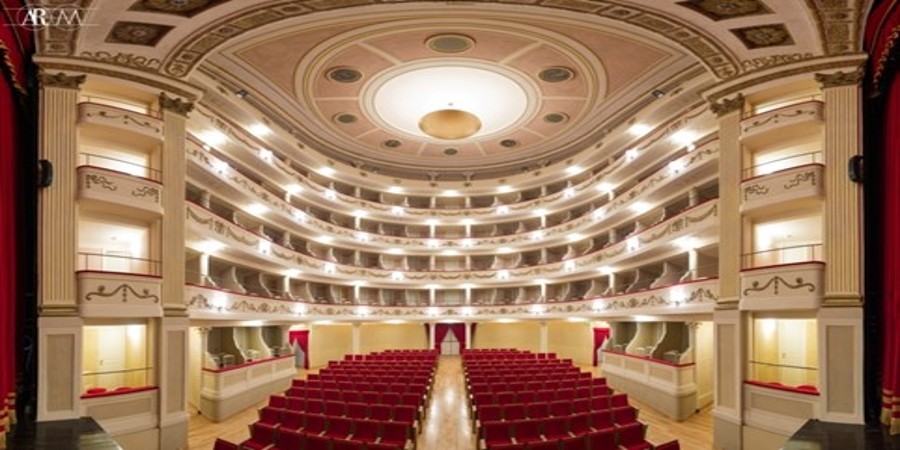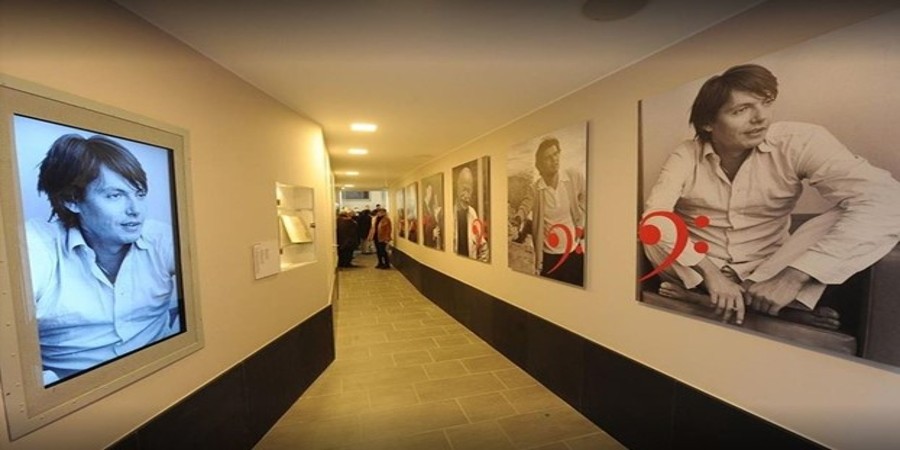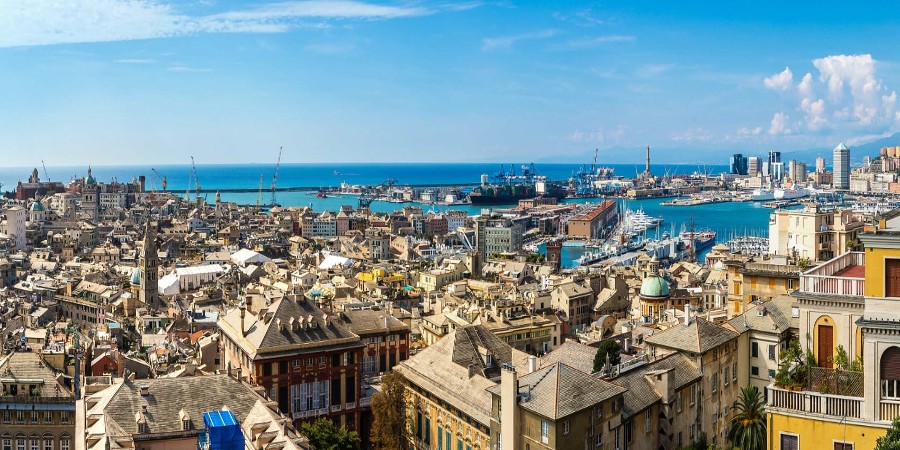GENOA IN MUSIC: IN LOVE WITH THE STREETS OF THE SINGERS - TRIP CODE: MUSICGENOA
5 days 4 nights
1st day: Arrival
Arrival in Genoa during the day, accommodation in a hotel in one of the most fascinating Genoese Rolli’s Building located in the heart of the historic center and free time at your disposal. Free dinner and overnight stay.
2nd day: Discovering De Andrè
Breakfast at the hotel. Meeting with the guide and beginning of the itinerary with a visit to the Museum in Via del Campo, at number 29, one of the key places in De Andrè's Genoa, which was once the music shop of his friend Gianni Tassio.
Today has been transformed into a museum dedicated to the singer-songwriter, to his friends, and to his Genoese colleagues, including Luigi Tenco.
The tour continues through the characteristic La Maddalena district, once animated by brothels and port prostitutes, who came to life in the most emblematic characters of De André's songs.
From here Via Roma 51 can be reached, to taste the authentic delicacies of the ancient Romanengo confectionery, mentioned in the famous piece Shipwreck of London Valor.
Extensive tasting of typical products, and visit to the ancient historic shop of the city.
Faber's story echoes in the arcades of Sottoripa, where in the 1950s De André frequented, together with his friend Paolo Villaggio, the restaurant Ragno Verde, mentioned in the novel "A ridiculous destiny". During the first years of his apprenticeship, Fabrizio performed in another club, La Borsa di Arlecchino, which was located in Via XX Settembre; on the same sidewalks Anna the Gorilla beat, with whom it is said that for a period De André even coexisted.
Finally, a stop on a bench of the celebratory "Via al mare Fabrizio De André", which will allow us to admire the suggestive ancient port of Genoa, and imagine Faber while he tends the recorder to the shouting of the fishmongers of the fish market, to insert it in the Creuza de mä recording. The itinerary in the footsteps of Fabrizio De André will not be complete without the Latteria Igea, on the corner of Via Cecchi and Via Cesarea, which Gino Paoli remembers in one of his songs: the Four friends at the bar were Paoli, Fabrizio, Tenco, and the lyricist Riccardo Mannerini, who lived in the bar building, and from whose poems songs like Il cantico dei drogati were born.
Last stop in the Sant’Ilario district, which will give us an exceptional view of Genoa. There it is possible to find the old railway station of Bocca di Rosa, and a book-shaped sculpture, on which we read an acrostic dedicated to the protagonist of one of Faber's most beloved songs. Genoa is in the music, but also in the life of the acclaimed singer-songwriter, among the aromas and flavors of the arcades of Sottoripa, between fry shops and historic grocery stores, where you can still taste "A cimma", the traditional veal and vegetables, to which he dedicated a song in dialect.
Lunch will be free. In the evening free dinner and overnight at the hotel.
3rd day: The Genoa of Bruno Lauzi, Gino Paoli and Luigi Tenco
Breakfast at the hotel, meeting with the guide and tour of the city to discover the footsteps of other famous songwriters who have intertwined their lives with tis magical city, dedicating songs and tributes to it.
Bruno Lauzi was born in Eritrea but becomes Genoese by adoption, perhaps more than the other Genoese songwriters he tells of his beloved city of him, to which he dedicates unforgettable verses.
He tells of the mysterious and sometimes impossible loves of the alleys near the port, he sings the sirocco and the streets on the sea.
It is in the 1975 album "Genova per noi", with the lantern on the cover in the foreground and the capital in the background, that Lauzi intertwines his important career as a songwriter with his adopted city. Gino Paoli it is from Monfalcone. He grew up in the Genoese district of Pegli, to which he will always be very close. Some of the greatest hits of Italian music are of Gino Paoli, including "Il cielo in una stanza", a refined melody mixed with intense poetics, which describes, as told by Paoli himself, the encounter with a prostitute which took place in a brothel in Genoa. “Senza fine”, “Sapore di sale”, “Quattro amici” and “La Gatta”, in which, without mentioning the location, evokes the period lived in the picturesque Boccadasse district.
Lastly, Luigi Tenco, who was born in Alessandria but soon moved with his family to Genoa Nervi. His most famous hits are "My lost days" and "I fell in love with you". He passed away prematurely during the Sanremo Festival in 1967, leaving signs of his life mainly in Boccadasse, a source of inspiration for some of his songs that represent the sea and a place where he had frequent encounters with his friends, including Fabrizio De Andrè.
Today we find a plaque affixed by the Municipality dedicated to the famous singer-songwriter. In the late afternoon aperitif in the enchanting setting of Boccadasse, sitting on the beach sipping a beer or a cocktail admiring the sea, the most famous of the ancient fishing villages, between Corso Italia and Capo Santa Chiara, characterized by the typical colored houses, the round pebbles of the beach and the neat boats. In the evening free dinner and overnight at the hotel.
4th day: Niccolò Paganini and Genoa
After breakfast at the hotel, in the morning meeting with the guide who will make you discover the world of Nicolò Paganini, a famous Genoese violinist, guitarist and composer.
The route starts from the Falcone Theater which is annexed to the Royal Palace, where Paganini performs on November 9, 1827 in the presence of King Carlo Felice and his family.
Going up via Cairoli, we take via Garibaldi where, inside Palazzo Tursi, we find the Paganiniana Room, located within the exhibition path of the Strada Nuova Museums.
Here is exhibited the famous violin made by Guarneri del Gesù in 1743, which Niccolò Paganini preferred among all the instruments he owned, affectionately calling it "my cannon violin" for the fullness of the sound.
The last stop will be the Carlo Felice Theater where on November 30, 1834 Niccolò Paganini plays for the first time.
Free lunch. In the afternoon free time at your disposal to discover the city of Genoa in freedom.
If you are dreaming of an evening of great emotions, we recommend that you attend a concert or an opera show in the magnificent setting of the Carlo Felice Theater, the most important theater in Genoa dating back to the nineteenth century. Free dinner and an overnight stay in hotel.
5th day: Departure
Breakfast at the hotel and departure for the return.









